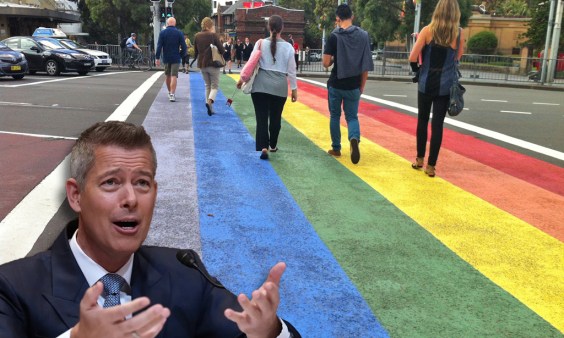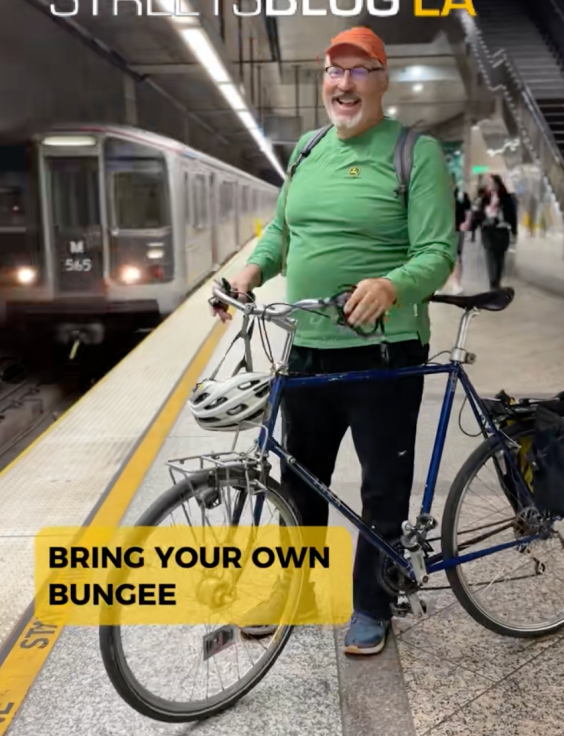On Aug. 5, actress Anne Heche, 53, crashed her car into a home in the Mar Vista neighborhood of Los Angeles, igniting a fire that destroyed both the residence and her vehicle and left Heche with severe injuries. On August 12, after more than a week in a coma, she was declared legally dead, leaving behind a 13- and 20-year-old son.
It is the kind of story that Vision Zero advocates don't talk about often, because it doesn't look anything like the vast majority of car crashes in America that kill or cause serious injury.
The road where Heche crashed is a quiet, two-lane residential street with a 25-mile-per-hour speed limit — a speed limit that doorbell camera video shows she shattered. Suffice it to say, this was not the kind of multi-lane arterial where pedestrian deaths disproportionately occur.
Moreover, Heche's car was a modest Mini Cooper, not a massive pick-up with bull bars or hulking SUVs that have saturated American streets in recent years — despite the outsized danger they post to anyone not in a comparably-huge vehicle, or even inside their homes.
Heche reportedly had cocaine in her system at the time of the crash, a substance that is involved in just 2.8 percent of roadway fatalities.
It's the kind of extreme collision that silences even the most avowed advocates of Vision Zero — the policy that states that all crashes can be prevented through better design, education, equipment — because, secretly, they are not totally sure the crash could have been prevented with the existing Vision Zero tools. The city of Oslo after all, didn't exactly achieve Vision Zero in 2017, because one driver died when he crashed into a fence. Despite our best intentions, we might have to admit that terrible things still happen, though that's no excuse not to do our best to save most lives.
For others, though, this is the kind of crash that undermines the whole idea of Vision Zero. Here is the proof that individual motorists, not unsafe systems, are the underlying problem. The only thing to do is to prosecute the ones who survive to the fullest extent of the law, one by one, until there are none left.
Instead of praying for Anne Heche, who drove drunk, crashed into a garage, took off and drove 90MPH in a residential area, crashing into a house & setting it ablaze, how’s about you donate to the woman whose home was completely destroyed & lost everythinghttps://t.co/hbuyzoKBkO
— Blair (@heatblair) August 7, 2022
To say that the reactions to Heche's crash on social media and traditional media have been polarized would be an understatement — though, in some ways, it also wouldn't be exactly true.
On one extreme of the debate are those who say Anne Heche deserves no sympathy because she made the choice to drive recklessly and under the influence of drugs. And there is no doubt that the actress endangered others; video suggests that she nearly struck a pedestrian before crashing into the home of Lynne Mishele, destroying the entire structure and all the possessions inside. That neither Mishele, who was home at the time, nor her pets, nor any other passerby were seriously injured or killed is nothing short of miraculous.
It is understandable, in some ways, why so many people have scrutinized Heche's own behavior for answers — even if the conclusions they jumped to were deeply problematic. They pored over a podcast she released before her crash in which she talks about drinking, and concluded that she must have been drunk at the time of incident, too (her representative clarified that the audio had been recorded weeks before). They scrutinized photos of bottles in her car's cupholder and declared that they were vodka, before authorities later confirmed there was no alcohol in her blood.
When it was revealed that Heche had tested positive for cocaine and fentanyl, they assumed that was why she was she was driving 90 miles per hour through a residential area, according to tabloid reports from unidentified "police insiders" — though lawyers were quick to point out we don't yet know whether she'd consumed enough of either substance to legally qualify as "impaired," and she may have even been given the fentanyl at the hospital.
Anne Heche won't see your tasteless take about how she deserves to die for driving under the influence, but your friends and family secretly struggling with addiction will.
— Tyler Woodbridge (@woodbridgetyler) August 12, 2022
Think before you post.
Always root for people to safely beat their demons.
On the other extreme of the debate are those who say Heche deserves no culpability for the crash that claimed her life — because of her self-reported history of mental health challenges and addictions.
People of this opinion point out that Anne Heche has long been open about the fact that she was a survivor of childhood sexual abuse and a series of major traumas throughout her life; that she endured decades of biphobia and years of blacklisting following her relationship with Ellen DeGeneres; that she was, in her words, "insane" for her first 31 years, and that she sometimes "escaped" to a "fantasy world" in which inhabited "another personality" to cope. They point out that her brother also died in a car crash at 18, which Heche herself believed was a suicide.
It's unstandable to see Heche as a victim (and it is certainly a more compassionate response than the alternative). Addiction does play a massive and largely understudied role in our traffic safety crisis, even as every state in America mounts massive anti-drunk driving campaigns that frame drunk driving as a simple and easily avoidable choice for all people in all instances.
Studies show that the average DUI offender, though, has driven drunk more than 80 times before she is caught, which Jennifer Homendy of the National Transportation Safety Board once aptly noted is "not just [a matter of] poor decisions [because] this person is in pain." Similar studies have not been conducted for drugged drivers, but in a country where 38 percent of adults battled an illicit drug addiction in 2017 alone, it's ludicrous to assume that everyone who drives high does so with malicious intent, or even simply because they are reckless. In huge, car-dependent swaths of America, driving is not optional, even for those who know they should not be behind the wheel.
This woman killed 6 ppl in LA by driving into an intersection going 90 mph. Her lawyers saying she has mental health issues & there were no signs of drugs/alcohol. #NicoleLinton & #AnneHeche both deserve jail time. IDGAF if they're mentally ill, they shouldnt have been driving. https://t.co/EIpZfr7THK
— OhThaShade aka The Mad "Hater" 😂😂😂 (@shade_tha) August 10, 2022
Friendly reminder that Anne Heche has struggled with mental illness for years, was molested by her father, her mother didn't believe her and she lost 3 of 4 of her siblings. Drunk driving is unacceptable but this woman has been through hell and back.
— I STAND WITH UKRAINE 🇺🇦 (@Heidos777) August 6, 2022
The impact of mental health disorders besides addiction on traffic safety are even less studied, despite the fact that one in five U.S. adults has one — and that number is a severe undercount if you take a more expansive definition of what psychological health means.
Mental illness is not some extreme category of disease that some other people have, but a spectrum upon which we all exist and move throughout our lives. As such, pretty much all of us who drive have at some point done so when we were not even remotely in a safe mind state to do it. We drive when we are under extreme stress, in profound grief, in states of debilitating distraction, and even in psychosis, which five to 10 percent of people will experience at some point in their lives. If we have a mental illness, there is roughly a 50-percent chance that we will also struggle with addiction, and many of us will use those substances to self-medicate in the absence of more traditional care. And again, if we live in car-dependent places that functionally require us to drive to meet our basic needs, sometimes we will drive when we know we shouldn't — because we have no choice.
Applying this lens to Heche's crash specifically, though, is also profoundly problematic, even if that impulse comes from a good place.
The fact is, we know nothing about Heche's mind state at the time of the crash. We know nothing about her diagnoses or her treatment or lack thereof, and how these things did or didn't impact her ability to drive — and it must be emphasized that the vast majority of people with mental illness can and do drive safely and without incident. We know nothing about why she drank or used drugs, or how often she did so, or how much she took — and making assumptions risks stigmatizing whole populations of people with mental illness and addiction who have never, and will never, harm another person, whether they are behind the wheel or not.
Just like those who would want Heche thrown in jail for life had she survived, assuming Heche was simply in extraordinary psychic pain and nothing could have been done to save her life is a dangerously insufficient response to vast and complex problem.
What we do definitively know about the crash that killed Anne Heche is this: it could have been prevented.
If ending car crash deaths is our actual goal, and not just a catch phrase, we will treat collisions like hers as both an outrage and a tragedy — and more important, an opportunity to talk about how to build a world where, as author Jessie Singer famously put it, there are no accidents.
We will install speed governors on all cars that automatically slow vehicles to non-lethal speeds when drivers speed through neighborhoods, whether they're speeding because they are selfish, or drunk, or high, or in the midst of terrifying psychotic episode or a seizure, or for literally any other reason. Ultimately, the reasons why people do dangerous things do not matter, and should not matter — not when we have the technology to physically prevent them from doing them in the first place.
We will stop treating enforcement as a cudgel that will deter 100 percent of drivers from behaving badly, because dangerous behavior is not always a rational choice — and that many forms of enforcement themselves carry its own significant dangers, particularly for people of color, and for people with mental illness.
We will robustly fund a wide variety of treatment for mental health conditions and addiction, even if neither is ultimately proven to have been a factor in Heche's death, simply because it is the only correct moral choice.
We will not pretend that everyone who drives drunk or high does so because they are evil or careless, but because they are struggling to safely withdraw from a substance to which they are addicted, or for a universe of other fundamental reasons that we can address by creating better systems of care, like simply running buses home from the bar.
We can do so much more than mourn and shrug and cast blame after people die in extreme car crashes on ostensibly slow streets in relatively safe cars. Instead, we can radically expand the radius of our compassion and urgently pursue life-saving strategies outside of our core comfort zone. Because if we don't, true Vision Zero will forever remain out of our reach.






